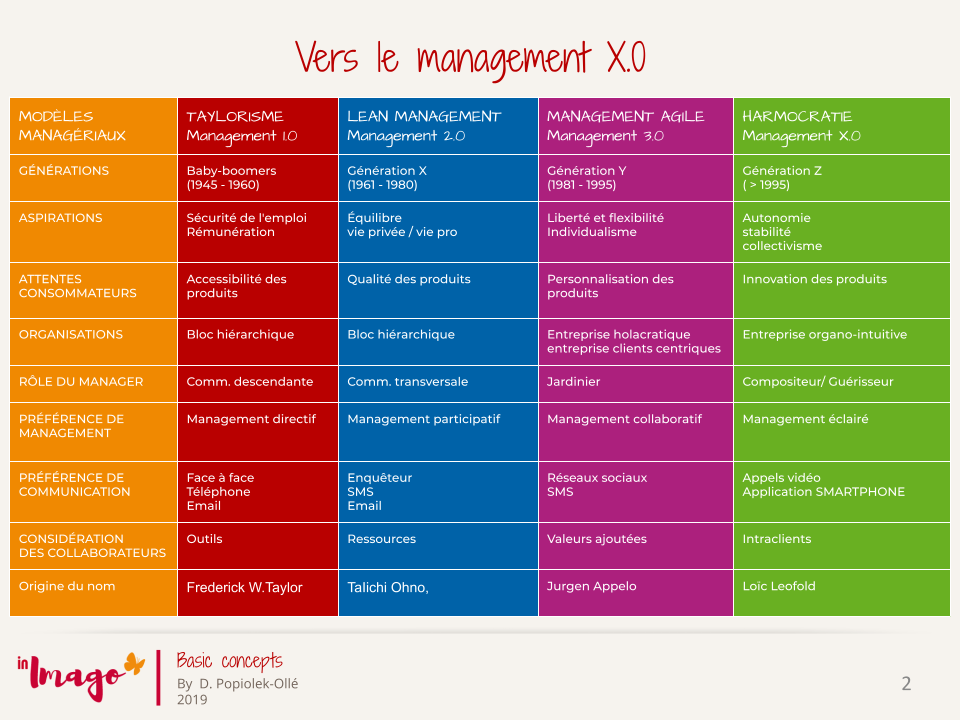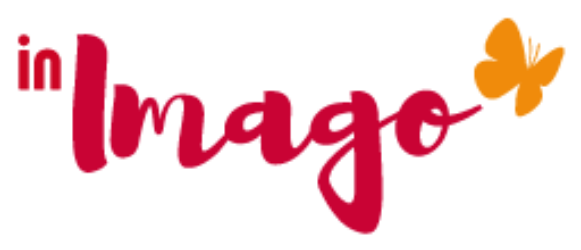The 20th century took us through 4 conventional managerial models: autocratic management, paternalistic management, delegated management and democratic management. Each of these models is associated with a style of leadership, a posture of delegation. These postures were staged by Jurgen Appelo in his game “Delegation Poker” where 7 + 1 leadership postures are practiced.
Context, managerial models and leadership
A posture is generally associated with a management style. However, these are behaviors that each leader can adopt depending on the context, the associated corporate culture and the degree of autonomy authorized (or accepted) for the teams. The table below shows the changes in managerial models.
Leadership in this table is seen through the role of the manager.

The different managerial styles
- Taylorism, Fordism – Management 1.0
- Frederic Winslow Taylor, from 1911 will seek a way to further increase performance. He is the founding father of Taylorism, and in our chart what we call management 1.0. The scientific organization of work is based on a horizontal organization where each employee performs basic tasks, and eliminates any unnecessary gesture. It also divides the work between employees (performers) and a management responsible for organizing work and productivity.
- Henry Ford brings to life Taylor’s principles of eliminating unnecessary gestures by bringing the necessary parts to the employee through an assembly line. Employees no longer have to travel.
- Lean Management – Management 2.0
The awakening of the industry in the flourishing post-war years characterizes the 20th century, a breaking point begins in the early 1970s. Managing complexity, performance becomes a challenge. Men and women, even within the organization, strive to mobilize and transfer responsibilities, thus opening the passage from autocratic management (Taylorism) to matrix management (Lean Management).
Lean Management is emerging in Toyota factories. The search for profitability is based on eliminating waste. The quantities ordered and produced are calculated based on demand, and everything is done to save as much as possible on unnecessary costs, including progressive automation of the machines. Individual qualifications are valued and the employee takes pride in belonging to a group.
Project management was born under the impetus of Lean, associating responsibility with the role one occupies in the delivery of the project thus initiating a change of posture.
- Agile Management – Management 3.0
The intersection of organizational charts and a matrix organization weighs down industrial processes. The world of service, in particular the digital service very attached to real-time delivery, is shaking up this heritage. Just-in-time no longer tolerates such a web of responsibility. We must simplify. At the dawn of the 21st century, the Agile Manifesto is published, a simple manifesto proposed by 17 developers….
This Agile Manifesto has revolutionized the way of working in 20 years by simply stating 4 values and 12 principles to put human interactions back at the heart of a company’s value production.
Delegation Poker : playing with managerial models
It is according to the context in Management 3.0 that the members of the team will take charge of the delegations of their management, according to what they think they are able to manage.
Management 3.0 proposes to use Delegation Poker as a tool for dialogue between managers and team members to jointly determine what will be delegated to the team. Delegation Poker thus makes it possible to determine the bases of autonomy and to allow the team to decide what it wants to take care of.
In game coaching, in executive coaching, this game makes it possible to address the “gap” between what leaders think about their delegation system and the teams’ understanding of delegation. The simple use of cards on a specific subject is an opportunity for alignment between team members and managers. This can be completed by implementing the “delegation board” or a value tree. Therefore, teams and managers progress together towards mutual trust.

Planning poker, delegation card and managerial models
The main character traits of the leaders are highlighted, leaving room for my personal interpretation for the allocation of delegation cards. The game aimed at the objective of a necessary delegation while certain management styles take delegation little into account.
1- the bossy style autoritaire ( Card #5- Advisor) – Autocratic management inherited from the beginnings of industrialization. The manager decides alone and imposes the model of realization.
The card #5- Advisor card is assigned to him because the authoritarian side can be masked by a form of artificial freedom. The style definition would then be:
The leader alone decides on the objectives to be achieved and ensures that his vision of things is shared by his teams. On the other hand, each one is free of the means to be implemented to achieve the expected result. But very often, the how is also suggested in advice mode.
2- the negotiator style (Card #2-Sell)
Card #2 of the Delegation Poker- game, selling applies here without hesitation.
To achieve the initial goal, the leader will negotiate with his teams the goal to be achieved. It may be necessary to provide compensation in order to get what you want such as overtime payment.
3- The directive style associated with paternalistic management (Card #1- Say)
Decisions are made with a firm hand. He is the Boss. This attitude is sometimes necessary, especially in the event of a crisis or emergency to be managed. This posture is generally attributed to the management style 2.0, so-called paternalistic management. This posture requires a continuous presence with the teams who will not make a decision without validation from the Boss.
The card #1- Saying card is here a direct and efficient mode of communication, which does not call for discussion.
4- The consultative style (Card #3- Consult)
The leader makes the decisions and has the last word but he goes into the field, the Gemba in Lean management, to collect the various ideas. He will then proceed to arbitration to implement the best ideas.
Card #3- Consult applies here.
5– The delegative style, the delegative management (Card #6- Get informed)
Competent teams, in which the leader places his trust, realize and decide if the leader should intervene and when. The tasks are well defined, the processes robust. The manager is an activator by showing the potential that is offered to us when the tasks are correctly carried out.
Card #6- Getting informed takes into account the posture of the leader, confident, kept informed of progress.
6-The participatory style – This is the style attributed to Democratic Management or 3.0 (Card #4-Agreement)
Decisions are taken collegially between the manager and the teams. Everyone takes the time to own the situation; exchanges between the leader and team members help to reach a consensus
The Card #4-Agreement is based on everyone’s approval, and the decision is made according to what each can and wants to take charge.
7- The unifying style (Card #7- Delegate)
The leader creates bonds with the members of his team. The objective is to create a certain harmony within the group, guaranteeing increased efficiency.
Card #7- Delegate is applied here with the idea that not only does everyone take charge but increases in competence, creating harmony and real pleasure to do.
8- Coach style (no card)
The 8th style has no associated card in “Delegation Poker”, a probable oversight of Jurgen Appelo who himself in his approach to Management 3.0 appropriates the role of Coach. This style, which encourages organic living management, allows the free expression of each individual, in the spontaneous growth of ideas.
In this style of team management, the personal development of each member is put forward. The goal is the development of everyone’s skills, whether technical or human, so that team members flourish in their work and in their relationships with others. This is a good way to move forward together and motivate your troops, and therefore achieve better results.
To discover the progress of a “Delegation poker” session, I invite you to go directly to the Management 3.0 platform or to discover it in My Agile’s customer journey
The Agile coach is the sum of these 8 postures
I invite you to discover this excellent article by my friend Judicaël Paquet which presents the 8 qualities of an Agile coach. It’s up to you to decide if these are qualities or postures.
Author : Dominique popiolek-Ollé, Transmutation leader, Agile Executive Coach, Founder of In Imago, management consulting and disruptive transformation.

